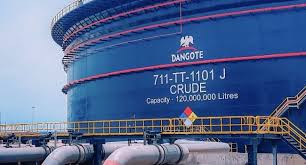AGF Fagbemi Urges Nigerian Judges To Be Fully Conversant With New Electricity Law
Dangote Refinery Supply Local Market with 79.4m Litres of Petrol by Sea

The Dangote Refinery has made a major contribution to Nigeria’s fuel supply, delivering around 79.4 million litres of petrol to the local market by sea.
The vessel Sabaek recently transported about 500,000 barrels (79.4 million litres) of petrol from the refinery to Lagos, according to a port report and Bloomberg’s ship-tracking data.
This first sea-based shipment follows a month of petrol distribution from the refinery by truck.
Devakumar Edwin, Vice President of Oil & Gas at Dangote Industries Limited, previously stated that 75% of the refinery’s local fuel supply will be transported by sea, focusing on areas like Warri, Port Harcourt, and Calabar.
According to Edwin, sea transport will cover key destinations such as Calabar, Port Harcourt, Warri, Apapa, and Atlas, with road transport only for urgent deliveries. This strategy aims to reduce road wear and cut down on transportation costs.
“We have both exporting facilities by sea and by road. 75% of the production can be evacuated through sea. Now we are ramping up to make it even 100%.
“Anything going to Calabar, Port Harcourt, Warri, Apapa, Atlas can all be taken through the sea. So only what is imminently required by road can be taken.
“But I also have the facility to load 83% of my production also through road. We have just built-in flexibility but we can avoid all traffic congestion on the road by evacuating through sea and it will also bring down the cost of transshipment,” Edwin said.
The refinery’s residue fluid catalytic cracker, a vital component for fuel production, is still ramping up, said a source familiar with the operations who preferred to remain anonymous.
With the ability to load 40 petrol tankers in just 40 minutes and handle up to 2,900 trucks daily, the refinery’s activity could significantly impact traffic along the Lekki-Epe corridor, encouraging the use of sea routes for distribution.
To manage traffic from the high volume of tankers around the Lagos Free Trade Zone, the Lagos State Government has introduced measures to ease potential congestion.
Moving fuel by sea not only reduces road traffic but also cuts distribution costs, boosting the refinery’s ability to meet domestic fuel demand.
The refinery’s local supply is helping the Nigerian National Petroleum Company (NNPC) manage domestic demand pressures, particularly as the NNPC faces significant debt obligations to international oil traders.






